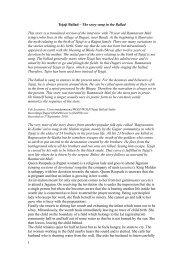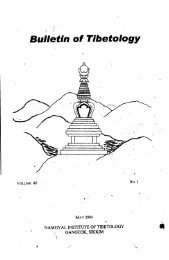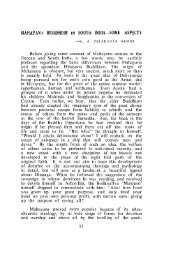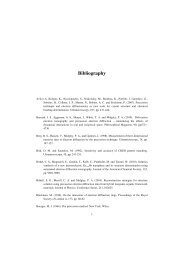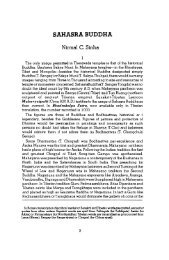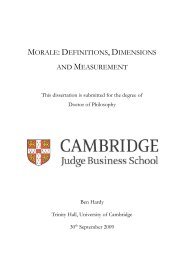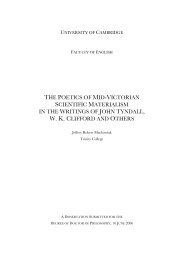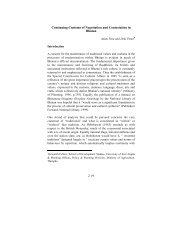The Crusades, the Genoese and the Latin East - DSpace at ...
The Crusades, the Genoese and the Latin East - DSpace at ...
The Crusades, the Genoese and the Latin East - DSpace at ...
You also want an ePaper? Increase the reach of your titles
YUMPU automatically turns print PDFs into web optimized ePapers that Google loves.
of James of Vitry <strong>the</strong>re is a similar paragraph about <strong>the</strong> avarice of <strong>the</strong> <strong>Genoese</strong>,<br />
<strong>the</strong> Pisans <strong>and</strong> <strong>the</strong><br />
Venetians <strong>and</strong> people from o<strong>the</strong>r parts of `Lombardy'. James's severe <strong>at</strong>titude towards <strong>the</strong> Italian<br />
merchants is reinforced by his famous accus<strong>at</strong>ion th<strong>at</strong> <strong>the</strong>y supplied war m<strong>at</strong>erials to <strong>the</strong><br />
Saracens 47' In conclusion, <strong>the</strong> lords of Gibelet or Byblos had many reasons to change <strong>the</strong>ir name.<br />
It was suggested above th<strong>at</strong> change of surname was typical of people of th<strong>at</strong> gener<strong>at</strong>ion in <strong>the</strong><br />
<strong>L<strong>at</strong>in</strong> <strong>East</strong>. <strong>The</strong> lords of Byblos were also eager to break <strong>the</strong> financial <strong>and</strong> feudal oblig<strong>at</strong>ions th<strong>at</strong><br />
linked <strong>the</strong>m to Genoa. However, it is possible th<strong>at</strong>, in addition to <strong>the</strong> reasons given above, <strong>the</strong>re<br />
was also a stigma <strong>at</strong>tached to <strong>the</strong> Embriaci regarding <strong>the</strong>ir place of origin which <strong>the</strong>y were trying<br />
to eradic<strong>at</strong>e when <strong>the</strong>y paved <strong>the</strong>ir way into <strong>the</strong> aristocracy of <strong>the</strong> crusader st<strong>at</strong>es. It is ironic th<strong>at</strong><br />
Willibr<strong>and</strong> of Oldenbourg remarked in 1211 th<strong>at</strong> <strong>the</strong> lord of Gibelet was French: `in ea [civit<strong>at</strong>e]<br />
domin<strong>at</strong>or quidam Francigena, Guido nominee, 9472<br />
or is this a sign of <strong>the</strong>ir social success?<br />
Genoa's claims of 1186<br />
In 1179, Genoa brought up again its dem<strong>and</strong>s over Gibelet. <strong>The</strong> commune turned to Pope<br />
Alex<strong>and</strong>er III for help on <strong>the</strong> grounds th<strong>at</strong> Gibelet was originally granted to <strong>the</strong> ca<strong>the</strong>dral church<br />
of St Lawrence <strong>and</strong> was, <strong>the</strong>refore, an ecclesiastical property. Pope Alex<strong>and</strong>er III wrote politely<br />
to Hugh II whom he addressed as `nobili viro Hugoni, domino Gibeleti. 9473 <strong>The</strong> pope <strong>the</strong>n<br />
mentioned th<strong>at</strong> he had received complaints from <strong>the</strong> archbishop <strong>and</strong> canons of St Lawrence about<br />
<strong>the</strong> payment due to <strong>the</strong>m. This letter was apparently ignored because in 1186, a year before<br />
Gibelet surrendered to Saladin, Genoa was still claiming its unpaid revenues. Pope Urban III<br />
wrote new letters. <strong>The</strong> claims were addressed to Hugh III, <strong>the</strong> heir of Hugh II <strong>and</strong> his successor as<br />
<strong>the</strong> lord of <strong>the</strong> city. Erik Bach interpreted <strong>the</strong> <strong>Genoese</strong> interest in <strong>the</strong> renewal of <strong>the</strong>ir privileges in<br />
<strong>the</strong> 1180s in <strong>the</strong> light of some diplom<strong>at</strong>ic developments in <strong>the</strong> region. In his opinion it was not a<br />
coincidence th<strong>at</strong> <strong>the</strong> <strong>Genoese</strong> dem<strong>and</strong>s came shortly before <strong>the</strong> fall of <strong>the</strong> kingdom: `les Genois<br />
paraissent avoir eu connaissance de ce que Saladin preparait une offensive de gr<strong>and</strong>e envergure<br />
contre I'Orient chretien, et ils ont done juge le moment venu d'exercer une pression par<br />
l'intermediaire du pape sur les maitres du pays pour faire respecter pleinement leurs privileges. ' 474<br />
This argument does not hold w<strong>at</strong>er; moreover, it reminds one of <strong>the</strong> more recent scholarly<br />
accus<strong>at</strong>ions of a <strong>Genoese</strong> conspiracy during <strong>the</strong> same years to manipul<strong>at</strong>e both <strong>the</strong> papacy <strong>and</strong> <strong>the</strong><br />
rulers of <strong>the</strong> crusader st<strong>at</strong>es. 475<br />
47 Jacques de Vitry, La Traduction de l'Historia Orientalis, ed. Claude Buridant (Paris, 1986), ch. 73, p.<br />
119<br />
472 Wilbr<strong>and</strong> of Oldenburg Peregrin<strong>at</strong>io, p. 168.<br />
4731<br />
Libri lurium, vol. 1/2, no. 315, p. 118.<br />
474<br />
Erik Bach, La Cite de genes au XI! siecle (Copenhagen, 1955), p. 150.<br />
473 Hans Mayer <strong>and</strong> Marie-Luise Favreau-Lilie suggested th<strong>at</strong> <strong>the</strong> <strong>Genoese</strong> claims were based on forged<br />
documents. Kedar challenged this argument <strong>and</strong> dismissed <strong>the</strong> idea of wh<strong>at</strong> he called `a vast <strong>Genoese</strong> plot'.<br />
132



